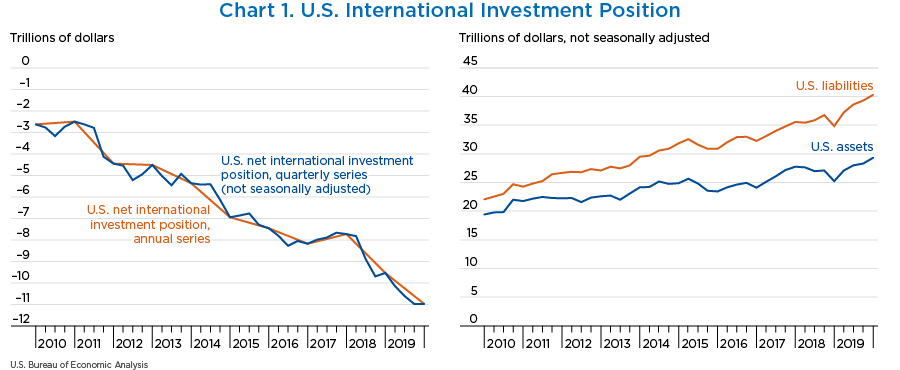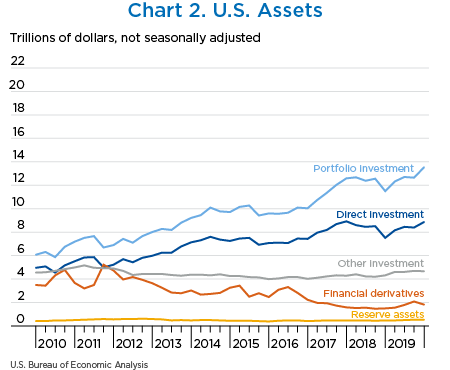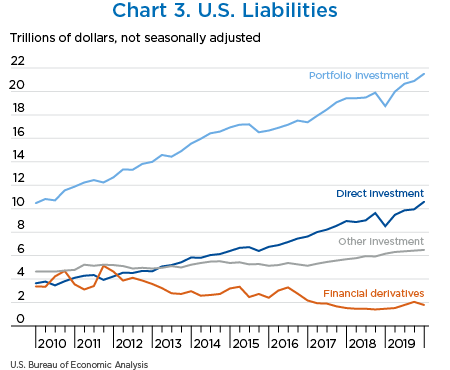U.S. International Investment Position
Fourth Quarter and Year 2019
The U.S. net international investment position—the difference between U.S. residents’ foreign financial assets and liabilities—was −$10.99 trillion at the end of the fourth quarter of 2019 (chart 1). Assets totaled $29.32 trillion, and liabilities were $40.31 trillion. At the end of the third quarter, the net investment position was −$10.98 trillion.
The U.S. international investment position is a statistical balance sheet that presents the dollar value of U.S. external financial assets and liabilities at a specific point in time. A negative net investment position represents a U.S. net liability to the rest of the world.
The −$14.1 billion change in the net investment position from the third quarter to the fourth quarter came from net financial transactions of −$91.2 billion and net other changes in position, such as price and exchange rate changes, of $77.1 billion (table A).
The U.S. net international investment position was −$10.99 trillion at the end of 2019, compared to −$9.55 trillion at the end of 2018 (chart 1). The −$1.44 trillion change in the net investment position from the end of 2018 to the end of 2019 came from net financial transactions of −$395.9 billion and net other changes in position, such as price and exchange rate changes, of −$1.04 trillion (table C).
| Type of investment | Position, 2019:III | Change in position in 2019:IV | Position, 2019:IV | ||
|---|---|---|---|---|---|
| Total | Attributable to: | ||||
| Financial transactions | Other changes in position1 | ||||
| U.S. net international investment position | −10,977.3 | −14.1 | −91.2 | 77.1 | −10,991.4 |
| Net position excluding financial derivatives | −11,007.7 | −3.8 | −90.3 | 86.4 | −11,011.5 |
| Financial derivatives other than reserves, net2 | 30.4 | −10.2 | −0.9 | −9.3 | 20.2 |
| U.S. assets | 28,279.2 | 1,038.2 | (2) | (2) | 29,317.5 |
| Assets excluding financial derivatives | 26,201.0 | 1,326.1 | −24.5 | 1,350.6 | 27,527.1 |
| Financial derivatives other than reserves | 2,078.3 | −287.9 | (2) | (2) | 1,790.4 |
| By functional category: | |||||
| Direct investment at market value | 8,366.2 | 471.5 | 9.7 | 461.9 | 8,837.7 |
| Equity | 7,077.6 | 486.7 | 14.5 | 472.2 | 7,564.3 |
| Debt instruments | 1,288.5 | −15.2 | −4.9 | −10.3 | 1,273.4 |
| Portfolio investment | 12,635.6 | 874.6 | 18.9 | 855.7 | 13,510.3 |
| Equity and investment fund shares | 8,770.2 | 743.3 | −97.2 | 840.6 | 9,513.5 |
| Debt securities | 3,865.4 | 131.3 | 116.2 | 15.1 | 3,996.7 |
| Short term | 757.9 | 65.0 | 63.5 | 1.5 | 822.9 |
| Long term | 3,107.5 | 66.3 | 52.7 | 13.6 | 3,173.8 |
| Financial derivatives other than reserves | 2,078.3 | −287.9 | (2) | (2) | 1,790.4 |
| Over-the-counter contracts | 2,038.0 | −282.7 | (2) | (2) | 1,755.3 |
| Single-currency interest rate contracts | 1,561.7 | −264.2 | (2) | (2) | 1,297.5 |
| Foreign exchange contracts | 313.5 | −25.4 | (2) | (2) | 288.1 |
| Other contracts | 162.8 | 6.9 | (2) | (2) | 169.7 |
| Exchange-traded contracts | 40.3 | −5.2 | (2) | (2) | 35.1 |
| Other investment | 4,694.3 | −29.6 | −53.4 | 23.7 | 4,664.7 |
| Currency and deposits | 1,929.7 | 54.1 | 39.5 | 14.6 | 1,983.8 |
| Loans | 2,710.6 | −83.1 | −92.0 | 8.9 | 2,627.5 |
| Insurance technical reserves | n.a. | n.a. | n.a. | n.a. | n.a. |
| Trade credit and advances | 54.0 | −0.7 | −0.9 | 0.2 | 53.3 |
| Reserve assets | 504.9 | 9.6 | 0.2 | 9.3 | 514.4 |
| Monetary gold | 388.4 | 7.7 | 0.0 | 7.7 | 396.1 |
| Special drawing rights | 50.0 | 0.8 | 0.1 | 0.7 | 50.7 |
| Reserve position in the International Monetary Fund | 25.6 | 0.5 | 0.2 | 0.4 | 26.2 |
| Other reserve assets | 40.8 | 0.6 | (*) | 0.6 | 41.4 |
| U.S. liabilities | 39,256.5 | 1,052.3 | (2) | (2) | 40,308.8 |
| Liabilities excluding financial derivatives | 37,208.7 | 1,329.9 | 65.7 | 1,264.2 | 38,538.6 |
| Financial derivatives other than reserves | 2,047.9 | −277.6 | (2) | (2) | 1,770.3 |
| By functional category: | |||||
| Direct investment at market value | 9,940.5 | 641.3 | 37.4 | 603.9 | 10,581.8 |
| Equity | 8,140.6 | 694.2 | 71.5 | 622.7 | 8,834.8 |
| Debt instruments | 1,799.9 | −52.9 | −34.1 | −18.8 | 1,747.0 |
| Portfolio investment | 20,865.9 | 614.4 | −28.2 | 642.6 | 21,480.3 |
| Equity and investment fund shares | 8,622.7 | 646.7 | −39.0 | 685.7 | 9,269.4 |
| Debt securities | 12,243.2 | −32.3 | 10.8 | −43.1 | 12,210.9 |
| Short term | 988.2 | −48.0 | −48.6 | 0.6 | 940.2 |
| Long term | 11,255.0 | 15.7 | 59.4 | −43.7 | 11,270.8 |
| Financial derivatives other than reserves | 2,047.9 | −277.6 | (2) | (2) | 1,770.3 |
| Over-the-counter contracts | 2,010.1 | −272.1 | (2) | (2) | 1,738.0 |
| Single-currency interest rate contracts | 1,547.5 | −271.3 | (2) | (2) | 1,276.3 |
| Foreign exchange contracts | 304.8 | −8.7 | (2) | (2) | 296.1 |
| Other contracts | 157.7 | 7.9 | (2) | (2) | 165.7 |
| Exchange-traded contracts | 37.8 | −5.6 | (2) | (2) | 32.2 |
| Other investment | 6,402.2 | 74.2 | 56.5 | 17.7 | 6,476.4 |
| Currency and deposits | 3,433.8 | 24.7 | 20.3 | 4.3 | 3,458.5 |
| Loans | 2,717.6 | 45.5 | 33.0 | 12.5 | 2,763.1 |
| Insurance technical reserves | n.a. | n.a. | n.a. | n.a. | n.a. |
| Trade credit and advances | 202.7 | 3.4 | 3.2 | 0.2 | 206.1 |
| Special drawing rights allocations | 48.1 | 0.7 | 0.0 | 0.7 | 48.8 |
- n.a.
- Not available
- (*)
- Value between zero and +/− $50 million
- Disaggregation of other changes in position into price changes, exchange rate changes, and other changes in volume and valuation is only presented for annual statistics released in June each year.
- Financial transactions and other changes in financial derivatives positions are available only on a net basis; they are not separately available for U.S. assets and U.S. liabilities.
Note. The statistics on positions are presented in table 1.2 of the international investment position (IIP) accounts on BEA's website. The statistics on financial transactions are not seasonally adjusted and are presented in table 1.2 of the international transactions accounts (ITAs) on BEA's website.
U.S. assets increased by $1.04 trillion to a total of $29.32 trillion at the end of the fourth quarter, mostly reflecting increases in portfolio investment and direct investment assets (chart 2). Portfolio investment assets increased by $874.6 billion to $13.51 trillion, and direct investment assets increased by $471.5 billion to $8.84 trillion. These increases were driven mainly by foreign stock price increases and the appreciation of foreign currencies against the U.S. dollar that raised the value of these assets in dollar terms.
Other changes in position contributed to the overall increase in U.S. assets (table A).
U.S. liabilities increased by $1.05 trillion to a total of $40.31 trillion at the end of the fourth quarter, mostly reflecting increases in direct investment and portfolio investment liabilities (chart 3). Direct investment liabilities increased by $641.3 billion to $10.58 trillion, and portfolio investment liabilities increased by $614.4 billion to $21.48 trillion. These increases were driven mainly by U.S. stock price increases that raised the value of these liabilities.
Both financial transactions and other changes in position contributed to the overall increase in U.S. liabilities (table A).
The U.S. international investment position statistics for the third quarter of 2019 have been updated to incorporate newly available and revised source data (table B).
| Preliminary estimate | Revised estimate | |
|---|---|---|
| U.S. net international investment position | −10,948.9 | −10,977.3 |
| U.S. assets | 28,261.6 | 28,279.2 |
| Direct investment at market value | 8,368.1 | 8,366.2 |
| Portfolio investment | 12,645.5 | 12,635.6 |
| Financial derivatives other than reserves | 2,078.3 | 2,078.3 |
| Other investment | 4,664.9 | 4,694.3 |
| Reserve assets | 504.9 | 504.9 |
| U.S. liabilities | 39,210.5 | 39,256.5 |
| Direct investment at market value | 9,919.2 | 9,940.5 |
| Portfolio investment | 20,868.3 | 20,865.9 |
| Financial derivatives other than reserves | 2,047.9 | 2,047.9 |
| Other investment | 6,375.2 | 6,402.2 |
The U.S. net international investment position was −$10.99 trillion at the end of 2019, compared to −$9.55 trillion at the end of 2018 (table C).
U.S. assets increased by $4.08 trillion to a total of $29.32 trillion at the end of 2019, reflecting increases in all major categories of assets, particularly in portfolio investment and direct investment assets (chart 2). Portfolio investment assets increased by $2.02 trillion to $13.51 trillion, and direct investment assets increased by $1.33 trillion to $8.84 trillion. These increases were driven mainly by foreign stock price increases that raised the value of these assets.
Both financial transactions and other changes in position contributed to the overall increase in U.S. assets (table C).
U.S. liabilities increased by $5.51 trillion to a total of $40.31 trillion at the end of 2019, reflecting increases in all major categories of liabilities, particularly in portfolio investment and direct investment liabilities (chart 3). Portfolio investment liabilities increased by $2.76 trillion to $21.48 trillion, and direct investment liabilities increased by $2.10 trillion to $10.58 trillion. These increases were driven mainly by U.S. stock price increases that raised the value of these liabilities.
Both financial transactions and other changes in position contributed to the overall increase in U.S. liabilities (table C).
| Type of investment | Position, 2018 | Change in position in 2019 | Position, 2019 | ||
|---|---|---|---|---|---|
| Total | Attributable to: | ||||
| Financial transactions | Other changes in position1 | ||||
| U.S. net international investment position | −9,554.7 | −1,436.7 | −395.9 | −1,040.8 | −10,991.4 |
| Net position excluding financial derivatives | −9,592.4 | −1,419.1 | −357.5 | −1,061.6 | −11,011.5 |
| Financial derivatives other than reserves, net2 | 37.7 | −17.5 | −38.4 | 20.8 | 20.2 |
| U.S. assets | 25,241.5 | 4,076.0 | (2) | (2) | 29,317.5 |
| Assets excluding financial derivatives | 23,749.2 | 3,777.9 | 426.9 | 3,350.9 | 27,527.1 |
| Financial derivatives other than reserves | 1,492.3 | 298.1 | (2) | (2) | 1,790.4 |
| By functional category: | |||||
| Direct investment at market value | 7,503.9 | 1,333.8 | 197.7 | 1,136.1 | 8,837.7 |
| Equity | 6,183.9 | 1,380.4 | 207.0 | 1,173.4 | 7,564.3 |
| Debt instruments | 1,320.0 | −46.6 | −9.4 | −37.3 | 1,273.4 |
| Portfolio investment | 11,491.4 | 2,018.9 | 35.9 | 1,983.0 | 13,510.3 |
| Equity and investment fund shares | 7,996.5 | 1,517.1 | −251.0 | 1,768.0 | 9,513.5 |
| Debt securities | 3,494.9 | 501.8 | 286.8 | 215.0 | 3,996.7 |
| Short term | 655.1 | 167.8 | 167.5 | 0.3 | 822.9 |
| Long term | 2,839.9 | 334.0 | 119.3 | 214.6 | 3,173.8 |
| Financial derivatives other than reserves | 1,492.3 | 298.1 | (2) | (2) | 1,790.4 |
| Over-the-counter contracts | 1,433.8 | 321.5 | (2) | (2) | 1,755.3 |
| Single-currency interest rate contracts | 954.3 | 343.2 | (2) | (2) | 1,297.5 |
| Foreign exchange contracts | 303.5 | −15.4 | (2) | (2) | 288.1 |
| Other contracts | 175.9 | −6.3 | (2) | (2) | 169.7 |
| Exchange-traded contracts | 58.4 | −23.4 | (2) | (2) | 35.1 |
| Other investment | 4,304.8 | 359.9 | 188.7 | 171.2 | 4,664.7 |
| Currency and deposits | 1,826.2 | 157.6 | 106.2 | 51.4 | 1,983.8 |
| Loans | 2,426.2 | 201.3 | 81.4 | 119.9 | 2,627.5 |
| Insurance technical reserves | n.a. | n.a. | n.a. | n.a. | n.a. |
| Trade credit and advances | 52.4 | 1.0 | 1.1 | −0.1 | 53.3 |
| Reserve assets | 449.1 | 65.3 | 4.7 | 60.7 | 514.4 |
| Monetary gold | 334.5 | 61.6 | 0.0 | 61.6 | 396.1 |
| Special drawing rights | 50.8 | −0.1 | 0.2 | −0.3 | 50.7 |
| Reserve position in the International Monetary Fund | 22.0 | 4.1 | 4.3 | −0.1 | 26.2 |
| Other reserve assets | 41.8 | −0.4 | 0.2 | −0.5 | 41.4 |
| U.S. liabilities | 34,796.2 | 5,512.6 | (2) | (2) | 40,308.8 |
| Liabilities excluding financial derivatives | 33,341.6 | 5,197.0 | 784.4 | 4,412.5 | 38,538.6 |
| Financial derivatives other than reserves | 1,454.6 | 315.7 | (2) | (2) | 1,770.3 |
| By functional category: | |||||
| Direct investment at market value | 8,483.3 | 2,098.5 | 310.8 | 1,787.7 | 10,581.8 |
| Equity | 6,797.3 | 2,037.5 | 282.4 | 1,755.1 | 8,834.8 |
| Debt instruments | 1,686.1 | 61.0 | 28.4 | 32.6 | 1,747.0 |
| Portfolio investment | 18,715.8 | 2,764.5 | 231.6 | 2,532.9 | 21,480.3 |
| Equity and investment fund shares | 7,420.2 | 1,849.2 | −226.8 | 2,076.0 | 9,269.4 |
| Debt securities | 11,295.6 | 915.3 | 458.4 | 456.9 | 12,210.9 |
| Short term | 981.9 | −41.7 | −44.8 | 3.1 | 940.2 |
| Long term | 10,313.7 | 957.1 | 503.2 | 453.9 | 11,270.8 |
| Financial derivatives other than reserves | 1,454.6 | 315.7 | (2) | (2) | 1,770.3 |
| Over-the-counter contracts | 1,394.6 | 343.5 | (2) | (2) | 1,738.0 |
| Single-currency interest rate contracts | 922.0 | 354.3 | (2) | (2) | 1,276.3 |
| Foreign exchange contracts | 298.9 | −2.8 | (2) | (2) | 296.1 |
| Other contracts | 173.6 | −8.0 | (2) | (2) | 165.7 |
| Exchange-traded contracts | 60.0 | −27.8 | (2) | (2) | 32.2 |
| Other investment | 6,142.4 | 334.0 | 242.0 | 92.0 | 6,476.4 |
| Currency and deposits | 3,255.4 | 203.1 | 196.4 | 6.7 | 3,458.5 |
| Loans | 2,639.1 | 123.9 | 35.7 | 88.3 | 2,763.1 |
| Insurance technical reserves | n.a. | n.a. | n.a. | n.a. | n.a. |
| Trade credit and advances | 198.8 | 7.3 | 10.0 | −2.7 | 206.1 |
| Special drawing rights allocations | 49.1 | −0.3 | 0.0 | −0.3 | 48.8 |
- n.a.
- Not available
- Disaggregation of other changes in position into price changes, exchange rate changes, and other changes in volume and valuation is only presented for annual statistics released in June each year.
- Financial transactions and other changes in financial derivatives positions are available only on a net basis; they are not separately available for U.S. assets and U.S. liabilities.


